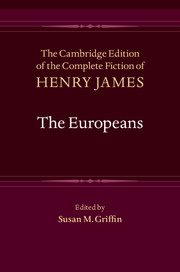Book contents
- Frontmatter
- Contents
- List of Illustrations
- Acknowledgements
- List of Abbreviations
- General Editors’ Preface
- General Chronology of James’s Life and Writings
- Introduction
- Textual Introduction
- Chronology of Composition and Production
- Bibliography
- The Europeans
- Glossary of Foreign Words and Phrases
- Notes
- Textual Variants
- Emendations
Textual Introduction
Published online by Cambridge University Press: 11 April 2021
- Frontmatter
- Contents
- List of Illustrations
- Acknowledgements
- List of Abbreviations
- General Editors’ Preface
- General Chronology of James’s Life and Writings
- Introduction
- Textual Introduction
- Chronology of Composition and Production
- Bibliography
- The Europeans
- Glossary of Foreign Words and Phrases
- Notes
- Textual Variants
- Emendations
Summary
On 30 March 1877, James wrote to William Dean Howells, describing the short novel that they had agreed would be published in the Atlantic Monthly, the magazine Howells edited. James had evidently not started writing what became The Europeans, but promised, ‘I shall give you it, or its equivalent, by Nov. next’ (CLHJ 1876–8 1:89). There proved to be delays on both sides. On 25 March 1878, James wrote to his father that ‘I am getting toward the close with my short serial for Howells, which I regret his delay in publishing’ (CLHJ 1876–8 2:72). On 6 May 1878, he sent Howells the third instalment (of four) of the novel. On 4 July 1878, James wrote to his mother that the manuscript had been completed (CLHJ 1876–8 2:162).
Unusually for James's writing, the manuscript of pages that correspond to all of Volume I and Books 1–3 of Volume II of the novel has survived; there is no known manuscript for the last three chapters of The Europeans. Yale University's Beinecke Library holds pp. 1–95 (Chapters 1–3) of the manuscript. No information on its provenance is available at this time except that, in 1979, Leon Edel had stated that pp. 1–13 were owned by Waring Jones of Wayzata, Minnesota. At some point these pages seem to have passed to Yale. Chapters 4–6, pp. 96–197, are in the Robert H. Taylor Collection, Princeton University Library. The Taylor Collection was placed on deposit in the Princeton University Library in 1972 and received as a bequest in 1985. The collection began c. 1930 and progressed to its present form in several distinct stages. It was moved to Princeton in 1960 and housed in the former Princetoniana Room in Firestone Library in 1972. Chapters 7–9, pp. 197–294, are in the Henry James Collection of the Clifton Waller Barrett Library, University of Virginia Library. These pages were part of the original 1960 deposit of Clifton Waller Barrett's library at the University of Virginia Library, which was converted to a gift, along with all other Barrett materials, in 1991. In 1979, Leon Edel published The Europeans: A Facsimile of the Manuscript (New York: Howard Fertig, 1979), bringing together all of the known fragments.
- Type
- Chapter
- Information
- The Europeans , pp. lvi - lviiiPublisher: Cambridge University PressPrint publication year: 2015



